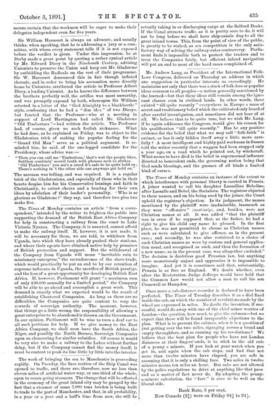The Times of Monday contains an article "from a corre-
-spondent," intended by the writer to frighten the public into supporting the demand of the British East Africa Company for help in constructing a railway from the coast to Lake Victoria Nyanza. The Company, it is asserted, cannot afford to make the railway itself. If, however, it is not made, it -will be necessary for them, we are told, to withdraw from Uganda, into which they have already pushed their stations, and where their agents have obtained native help by promises of British protection and support. But the withdrawal of the Company from Uganda will mean "inevitable ruin to missionary enterprise," the recrudescence of the slave-trade, which would practically be put an end to by our retention of supreme influence in Uganda, the sacrifice of British prestige, and the loss of a great opportunity for developing British East Africa. If, however, Parliament will grant "a maximum sum -of only £40,000 annually for a limited period," the Company will be able to go ahead and accomplish a great work. This -demand is exactly what we expected would be the result of establishing Chartered Companies. As long as there are no difficulties, the Companies are quite content to reap the rewards of sovereign authority. The moment, however, -that things go a little wrong, the responsibility of allowing a • great enterprise to be abandoned is thrown on the Government. In our opinion, Parliament will be wise to turn a deaf ear to all such petitions for help. If we give money to the East Africa Company, we shall soon have the South Africa, the Niger, and possibly the North Borneo, Sovereign Companies upon us clamouring for similar subsidies. Of course it would be very nice to make a railway to the Lakes without further delay, but if the Company cannot find the money itself, it must be content to push its line little by little into the interior.


































 Previous page
Previous page